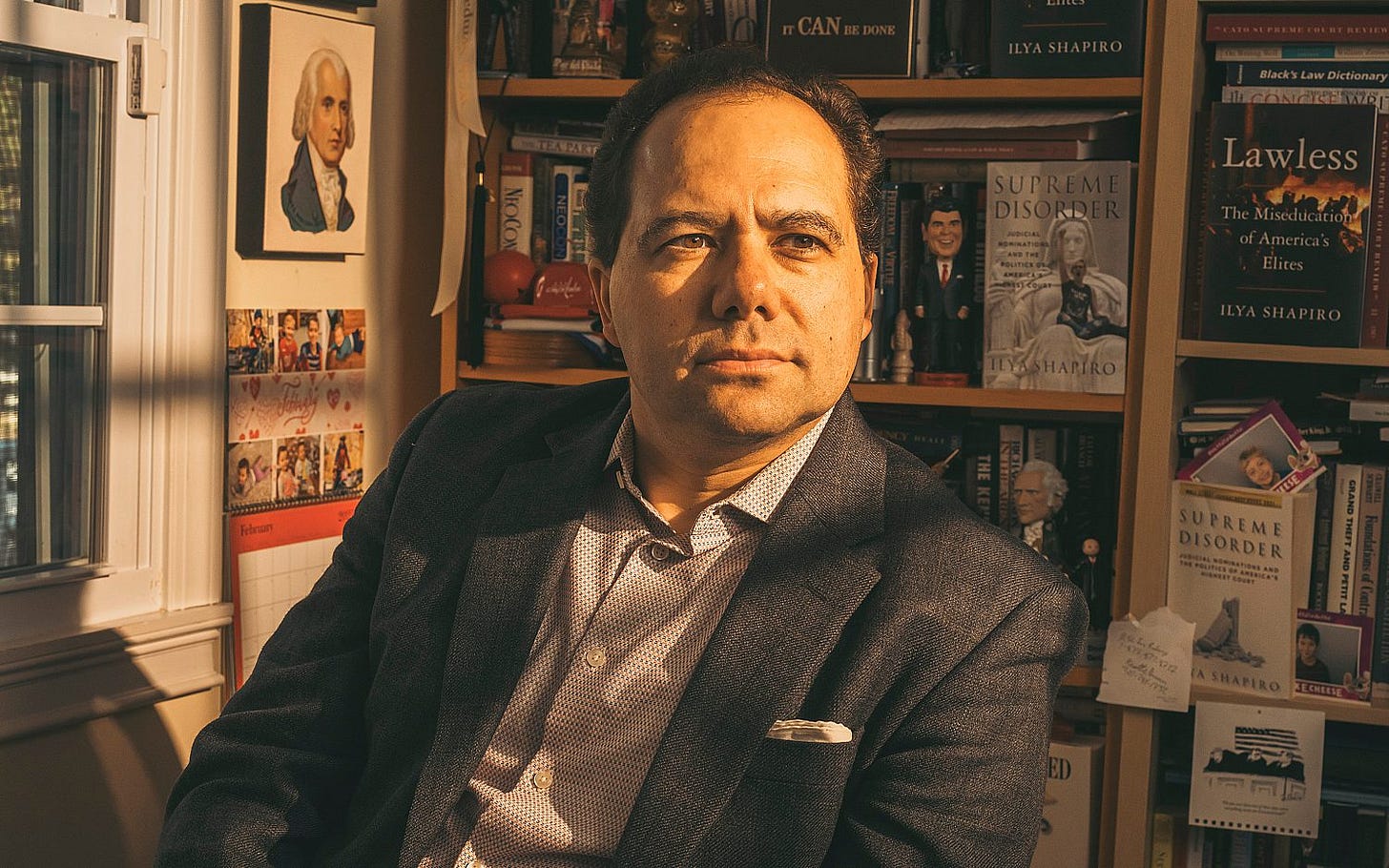Power trip
Freedom Conservatives seek to restore constitutional checks and balances
The “administrative state” is more than just an ideological catchphrase or political epithet. It describes a very real set of organizations, structures, and practices that undermine America’s republican order and disrupt democratic accountability.
The U.S. Constitution doesn’t authorize a “fourth branch” of government entities that can enact major policy changes without congressional approval, administer programs and expend funds independent of the presidency, and act as both prosecutor and judge in their own cases.
In our Statement of Principles, Freedom Conservatives observed that “equality under the law is a foundational principle of American liberty” that is “under attack from those who believe that the rule of law does not apply to them.”
“One manifestation of this problem is the explosion of unaccountable and unelected regulators who routinely exceed their statutory authority and abridge Americans’ constitutional rights.”
FreeCons champion the separation of powers and our constitutional system of checks and powers. America needs an effective national government to serve legitimate national ends — but that government must ultimately be accountable to the people, through elections of presidents and lawmakers, and to the law, through an independent judiciary that applies statutes, precedents, and the Constitution consistently and without substituting their own preferences for those of duly elected policymakers.
That is why so many FreeCons have spent so many years challenging the administrative state. We’ve done so during Democratic as well as Republican administrations. It’s not about one party, or one person. It’s about fundamental principle.
Don’t like something President Obama did, or President Trump wants to do? Fine. Reverse or oppose such policies through constitutional means.
It should be Congress and the courts that act as checks on a president, not chimera-like agencies possessing slivers of legislative, executive, and judicial power.
Today we feature FreeCons who seek to revive American constitutionalism.
Playing with fire
Ilya Shapiro is director of constitutional studies at the Manhattan Institute and author of the new book Lawless: The Miseducation of America’s Elites. He’s also a FreeCon signatory.
In a recent Washington Examiner piece, Shapiro summarized the many legal challenges to President Donald Trump’s dismissal of federal commissioners and agency heads, predicting that the U.S. Supreme Court is more likely to side with the administration than with its adversaries.
“Even if Congress creates all federal agencies, which is why the president can’t shut down the Department of Education by executive order, they can’t just be a free-floating extra-constitutional nebula,” he wrote.
The U.S. Constitution vests the executive power “in one person: the president,” Shapiro explained.
“The growth of the administrative state and the gradual shifting of federal power to the executive branch, in part because Congress can thus pass the buck and avoid making hard political choices, have made our ‘chief magistrate’ into an awesome figure.”
Constitutional checks and balances are consistent with the separation of powers. Indeed, they depend on it.
Restoring the president’s power to hire and fire federal officials “answers the question of who possesses executive power, not that power’s scope,” Shapiro argued.
Real authors
Emmett McGroarty is executive director of Belmont Abbey College’s house on Capitol Hill and a faculty fellow in its Honors College. He is also a FreeCon signatory.
In a recent article for First Things, McGroarty argued that the creation of the U.S. Department of Education in 1980 was a blow to the proper separation of powers among the three federal branches as well as that of Washington vs. the states.
The department’s structural context “contravenes Alexander Hamilton’s warning in Federalist No. 70 about dividing executive power,” he wrote.
“Where executive power is diffused, blame for poor decisions is ‘shifted from one to another with so much dexterity, and under such plausible appearances, that the public opinion is left in suspense about the real author.’”
With Congress no longer effectively exercising its powers of policymaking and the purse, and Department of Education bureaucrats often operating outside of legislative or presidential oversight, the result was a series of wrongheaded mandates and curricular changes.
Eliminating the department would remove this nefarious influence — as would congressional action to end the coercive use of federal funding.
“The return to high-quality education and a cohesive society will not happen unless the American people demand reform of their state governments, in red and blue states alike,” McGroarty concluded, “and engage on matters of academic content.”
Pass bills, not the buck
Kevin Kosar is a senior fellow at the American Enterprise Institute and co-founder of the Legislative Branch Capacity Working Group, a transpartisan project to strengthen the legislative branch. He’s also a FreeCon signatory.
In a recent piece for the Washington Examiner, Kosar observed that if the Trump administration wants to reform, restrain, and reduce the cost of the federal government, executive orders will only get them so far.
“The U.S. Constitution fractures governing power among the branches and assigns all legislative authority to Congress,” he wrote. The “first and most direct power” of the federal executive is “over the appearance of governing, not governing itself.”
“Voters and the media they rely upon would be wise to remember that addressing immigration, the skyrocketing deficit, and other big problems requires the president and legislators to bargain out new legislation,” he wrote. “Only then can all promises made be kept.”
In a follow-up article, Kosar praised U.S. Reps. Pete Sessions (R-TX) and Kweisi Mfume (D-MD) for collaborating on efforts to rein in fraud and other improper payments by federal agencies.
New legislation will be required to upgrade information technology and authorized other tools “to weed out unqualified applicants.”
In the mix
• In City Journal, FreeCon signatory Jordan McGillis predicted that the latest round of tariffs would have a punitive effect on one of his favorite products: a cocktail called the Last Word made of gin, maraschino liqueur, Chartreuse, and lime juice.
Factoring in higher prices caused by both American taxes on imports and Europe’s retaliatory taxes, the drink will cost as much as $12.50 — “a difficult price to choke down for a do-it-yourself drink,” wrote McGillis, City Journal’s economics editor.
“Take my Last Word experience and multiply it across thousands of products nationwide, and it’s easy to see how tariffs quickly could become an everyday irritant for millions of Americans.”
• In USA Today, Pope Foundation president John Hood cited a recent poll showing that most voters think Washington spends more on foreign aid than on Social Security. Such surveys about the federal deficit show voters “misunderstand the causes and underestimate the necessary remedies.”
“Far too many left-leaning people think it’s largely a revenue matter and can be addressed by hiking taxes on millionaires and billionaires,” wrote Hood, one of the founders of the Freedom Conservatism project. “Doing so might realistically nudge federal revenues up modestly as a share of GDP, by a percentage point or so. But our deficits are running closer to 7% of GDP.”
Meanwhile, far too many right-leaning people believe combating fraud and axing a few discretionary programs such as foreign aid will do the job. But “the sum of Social Security, Medicare, Medicaid, national defense, and debt service represents 76% of all federal spending. Eliminate every other federal expenditure and that still wouldn’t balance the budget.”
“Voters deserve to know the truth. They deserve politicians willing to speak it.”
• At Law & Liberty, FreeCon signatory Thomas Savidge pointed out that current outrage at the mere mention of the federal government ending transfers to states and localities proves the accuracy of Frederic Bastiat’s definition of government as “the great fictitious entity by which everyone seeks to live at the expense of everyone else.”
“It‘s time to end the co-dependent relationship caused by federal transfers,” wrote Savidge, a research fellow at the American Institute for Economic Research.
“Making the conscious decision to end the relationship now will be far less painful than if it must be forcibly severed when the federal government faces a fiscal crisis.”



